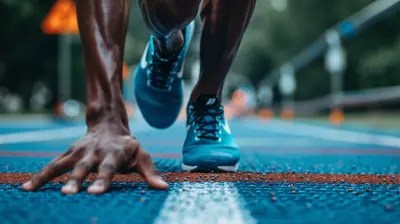Why Your Recovery Routine Needs to Include Mental Relaxation
1 October 2025
When you think of recovery, what comes to mind? Ice baths? Protein shakes? Stretching like a yoga guru? Sure, those things are great, but if you’re skipping mental relaxation, you're only doing half the job.
Listen, your body and brain are like a power couple—they need to work together. If one is exhausted, the other follows suit. So if you’re hitting the gym, grinding at work, or just navigating life’s chaos, it's time to prioritize mental relaxation. Let’s dive into why your recovery routine is incomplete without it and how you can level up your game. 
The Mind-Body Connection: More Than Just a Buzzword
Your brain isn’t just sitting in your skull for decoration; it controls everything. Stress, anxiety, and burnout? Those don’t just affect your mind—they wreak havoc on your body too.When you're mentally drained, your cortisol levels spike, your sleep takes a hit, and your muscles don’t recover as fast. It’s a vicious cycle: Exhaustion leads to stress, stress leads to poor recovery, and poor recovery leads to...well, feeling like garbage.
Adding mental relaxation to your routine is like hitting the reset button for your entire system. When your brain is calm, your body can do its thing—repair, rebuild, and come back stronger. 
The Invisible Toll of Stress on Recovery
Think stress is just "all in your head"? Think again. Chronic stress messes up everything:- Muscle Recovery: High cortisol slows down protein synthesis, meaning your gains take a backseat.
- Sleep Quality: Stress keeps your mind racing at night, robbing you of deep, restorative sleep.
- Energy Levels: A stressed-out brain keeps your adrenal glands on overdrive, leaving you exhausted.
- Immune Function: Ever noticed you get sick when you're overworked? Your immune system crashes under chronic stress.
Basically, ignoring mental relaxation is like running a marathon with weights strapped to your ankles. It’s slowing you down, whether you realize it or not. 
What Exactly Is Mental Relaxation?
Okay, so mental relaxation sounds good, but what does it actually mean? No, it’s not just sitting on the couch binge-watching Netflix (though, let’s be real—that helps sometimes). Mental relaxation is about actively giving your brain a break through techniques that reduce stress, improve focus, and support recovery.Different Forms of Mental Relaxation
- Mindfulness & Meditation – Taking even 10 minutes a day to breathe deeply and be present works wonders.- Journaling – Brain-dump your thoughts onto paper to clear mental clutter.
- Breathwork – Controlled breathing helps lower stress hormones almost instantly.
- Visualization – Imagine your body recovering and getting stronger—yes, really, it works!
- Unplugging from Screens – Scrolling endlessly? Bad idea. Give your brain a digital detox.
- Nature Therapy – A walk in the park? Instant mood booster.
If you're not incorporating at least one of these, you're leaving recovery gains on the table. 
The Science Behind Mental Relaxation and Recovery
If you’re still skeptical, let’s get nerdy for a second. Science backs this up!- Cortisol Control: Meditation and breathing exercises help lower elevated cortisol levels, which speeds up muscle repair.
- Better Sleep: Mental relaxation improves sleep patterns, making sure you're hitting that deep, restorative sleep phase.
- Increased Growth Hormone Production: Sleep and relaxation enhance the release of growth hormone, which is essential for muscle recovery.
- Faster Nervous System Recovery: Your nervous system, especially the parasympathetic branch, thrives on relaxation techniques. This means quicker reflexes, better coordination, and less fatigue.
Recovery isn’t just about what you do; it’s also about what you don’t do. Slowing down is just as crucial as pushing hard.
How to Incorporate Mental Relaxation into Your Recovery Routine
Now that you're convinced (or at least intrigued), how do you actually fit this into your daily life? The good news? It’s easier than you think.1. Make It a Non-Negotiable
Treat mental relaxation like your workouts. You wouldn’t skip training, so why skip brain recovery? Schedule it into your day, even if it’s just 10 minutes.2. Stack It with Other Habits
Pair mental relaxation with something you're already doing:- Meditate after brushing your teeth.
- Journal while drinking your morning coffee.
- Breathe deeply while stretching post-workout.
3. Start Small, Then Build
Overhauling your routine overnight? Not realistic. Start with one technique, master it, then add more.4. Tech Can Help—But Use It Wisely
Apps like Headspace, Calm, or even guided YouTube meditations can make this process easier. Just don’t let them turn into another excuse to stare at your phone all day.The Bottom Line: Your Recovery Is Incomplete Without Mental Relaxation
Still think mental relaxation is just some woo-woo nonsense? Think again. If you’re serious about recovery—whether that’s from workouts, work stress, or life in general—you need to give your brain the same attention you give your body.Skipping mental relaxation is like trying to drive a car with a flat tire—sure, you might move forward, but you're making everything harder on yourself. So, do yourself a favor: Slow down, breathe, and let your mind recover. Your body will thank you for it.
all images in this post were generated using AI tools
Category:
Post Workout RecoveryAuthor:

Holly Ellison
Discussion
rate this article
1 comments
Solenne Jennings
Incorporating mental relaxation into your recovery routine is essential for holistic healing. It not only reduces stress but also enhances physical recovery, fostering a balanced approach to overall well-being and resilience. Nurture your mind for optimal health.
October 26, 2025 at 3:53 AM

Holly Ellison
Absolutely! Mental relaxation is crucial for holistic healing, as it complements physical recovery and promotes overall well-being. Thank you for highlighting its importance!


